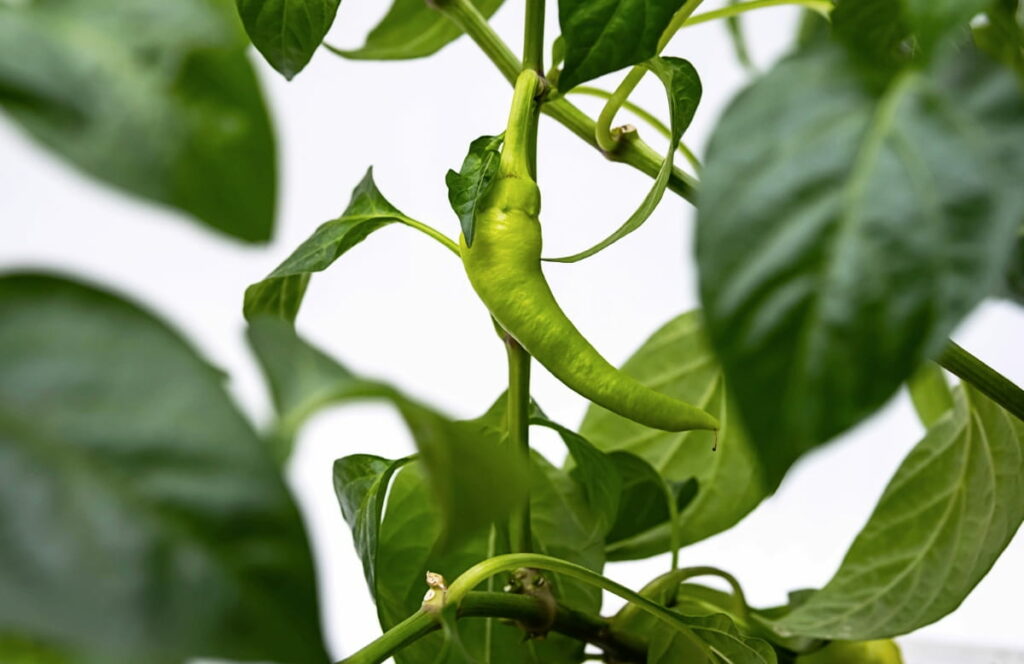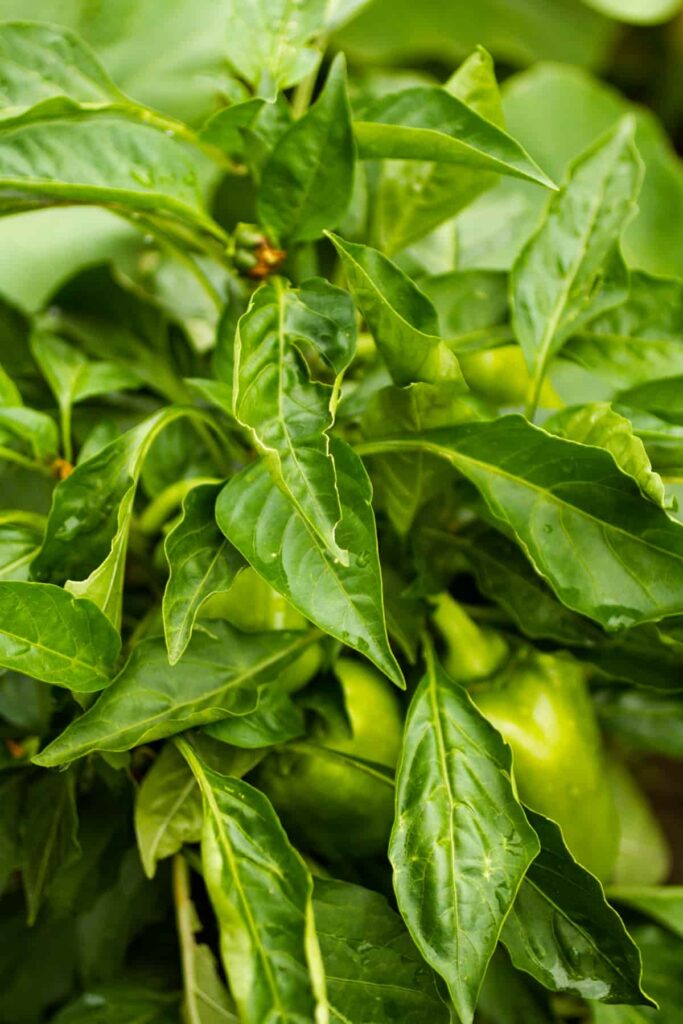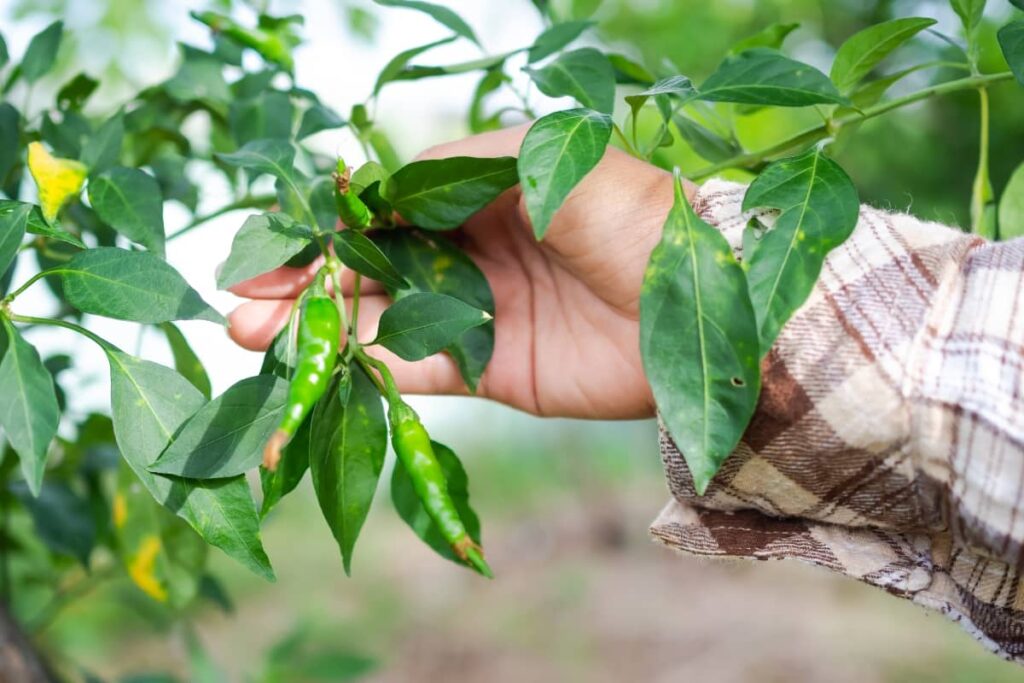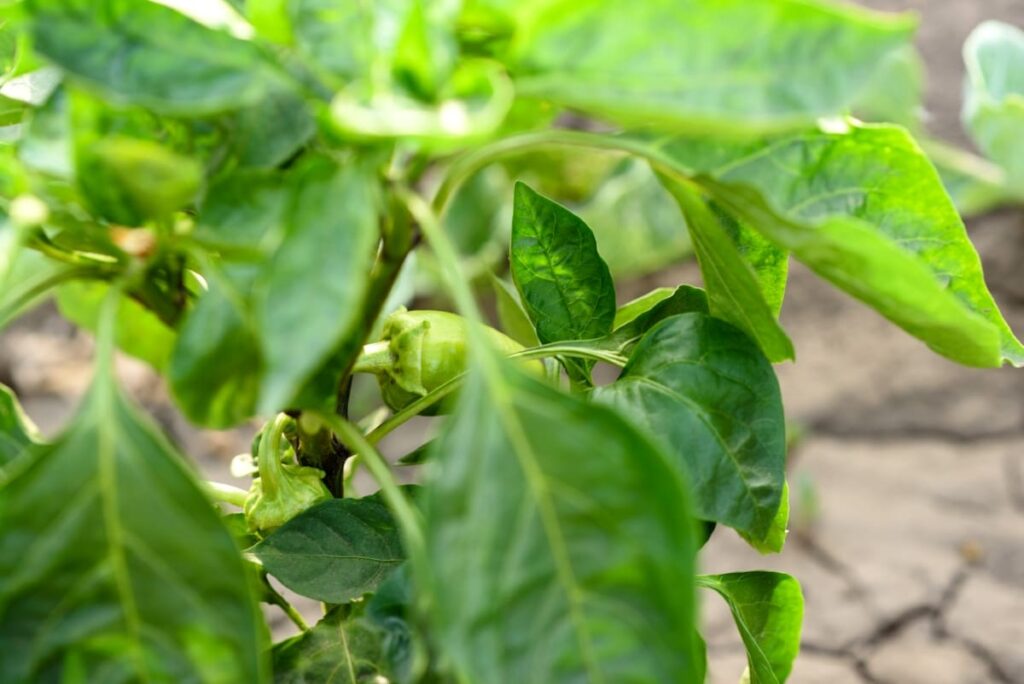Pepper Leaf Curl Virus, also known as PepLCV, is a destructive DNA virus that belongs to the genus Begomovirus and the family Geminiviridae. This virus primarily affects pepper plants, specifically those from the genus Capsicum. Once infected with the Pepper Leaf Curl Virus, pepper plants exhibit noticeable symptoms such as curling and twisting of leaves, stunted growth, yellowing or mottled discoloration of foliage, and reduced fruit production. Fortunately, there are several methods available for effectively managing the Pepper Leaf Curl Virus (PepLCV).

Pepper Leaf Curl Virus Treatment
Organic Remedies for Chilli Pepper Leaf Curl Virus
Homemade Organic Sprays
Firstly, we have the garlic spray. Mix crushed garlic cloves and water in a spray bottle. This potent concoction acts as a natural insect repellent and can help deter pests that spread the virus. Another great option is neem oil spray. Dilute some neem oil in water and spray it onto your chili plants regularly to keep those pesky viruses at bay.
Beneficial Microorganisms
The main beneficial microorganisms that can be particularly effective against the virus are known as mycorrhizal fungi. These amazing creatures form a symbiotic relationship with plant roots, helping them absorb nutrients more efficiently and boosting their overall immune system. Adding these beneficial microorganisms to your garden or field can greatly improve the resilience of your chili pepper plants against the leaf curl virus.
Natural Treatments for Pepper Leaf Curl
Herbal Extracts and Plant-Based Solutions
Herbal extracts, such as neem oil, have been used for centuries to control various diseases. Another popular option is garlic extract. You can make your garlic extract by crushing a few cloves and mixing them with water. Spray this solution on your pepper plants every few days to protect them from the leaf curl virus. Plant-based solutions like compost tea or seaweed extract are also beneficial in boosting the immune system of pepper plants.
Companion Planting for Disease Prevention
By strategically placing plants next to each other, you can help to reduce diseases like Pepper Leaf Curl Virus. The best companion plants for peppers are marigolds and basil.
Chemical Control of Pepper Leaf Curl Virus
Selecting the Right Chemical Treatments
Selecting the right chemicals is crucial to ensure effective results without causing harm to human health. The main option for chemical control is using systemic insecticides that target pests like whiteflies, which are known vectors of this virus. Another approach is foliar sprays that contain acaricides or fungicides.
Application Techniques and Safety Measures
Choose the appropriate time for applying treatments. It’s best to treat your pepper plants early in the morning or late in the evening when temperatures are cooler. This helps prevent damage caused by extreme heat during midday. Next, make sure to follow proper dilution rates specified on product labels.
Integrated Management of Chilli Plant Viruses
Combining Organic and Chemical Methods
By harnessing the power of nature alongside targeted chemical treatments, growers can achieve better control over these devastating viruses. Organic remedies play a vital role in managing chili plant viruses. Homemade organic sprays made from ingredients like neem oil or garlic extract have shown great promise in reducing virus transmission.
Monitoring and Early Intervention Strategies
By regularly inspecting your pepper plants for signs of infection, you can detect the virus at its earliest stages and take immediate action. Early intervention involves pruning off infected leaves or branches as soon as they are detected. This helps reduce the number of virus particles present in the garden. Clean all tools used on infected plants before moving on to healthy ones.
In case you missed it: Leaf Curl Virus Treatment in Cucurbits: A Comprehensive Management Guide

Eco-Friendly Solutions for Pepper Virus
Environmentally Sustainable Practices
By adopting eco-friendly solutions, we can effectively control the virus while minimizing harm to the environment. One approach is reducing chemical dependency in cultivation. Instead of relying solely on chemical treatments, farmers can explore alternative methods such as organic sprays and beneficial microorganisms. Another eco-friendly solution to control the Pepper leaf curl virus is practicing crop rotation and field sanitation. This method reduces reliance on pesticides and promotes long-term sustainability in agriculture.
Reducing Chemical Dependency in Cultivation
The effective way to control the Pepper leaf curl virus is through organic farming practices. By using natural compost and manure instead of synthetic fertilizers, farmers can enrich the soil with essential nutrients while minimizing the risk of water pollution caused by chemical runoff. Crop rotation is another technique that helps break the cycle of pests and diseases, thereby reducing reliance on chemical pesticides.
Preventative Measures for Leaf Curl in Chilli
Crop Rotation and Field Sanitation
Crop rotation involves alternating the cultivation of chilli with other non-host crops in different seasons or planting cycles. By rotating crops, you disrupt their ability to multiply and spread, ultimately reducing the incidence of leaf curl virus. In addition to crop rotation, maintaining proper field sanitation is crucial for preventing leaf curl infection in chilli plants.
This includes removing any infected plant debris from previous seasons to eliminate potential sources of infection. Regularly cleaning tools and equipment used during farming activities also play a major role in preventing disease transmission.
Resistant Varieties and Seed Selection
Resistant varieties are specifically developed through a rigorous selection process that identifies plants with genetic traits that make them less susceptible to diseases like PepLCV. The main pepper varieties that are resistant to leaf curl virus are “California Wonder,” “Jalapeno M,” and “Sweet Banana.” Seed selection is another crucial aspect when it comes to preventing leaf curl in chili peppers. It’s important to source seeds from reputable suppliers who prioritize disease-free production and maintain strict quality control measures.
Biological Control Agents for Pepper Diseases
Utilizing Natural Predators and Parasites
These biological control agents can target and eliminate pests that transmit the virus, helping to reduce its spread. The example of a natural predator is the ladybug and parasitic wasps. Using biological control agents not only helps protect your peppers from disease but also promotes ecological balance in your garden.
Biopesticides and Their Application
Biopesticides are a valuable tool in the battle against pepper leaf curl virus. These natural alternatives to chemical pesticides are derived from living organisms like bacteria or plant extracts. They offer a sustainable approach to eliminating pests without harming the environment. The main type of biopesticides commonly used against viral diseases like pepper leaf curl is called Bacillus thuringiensis (Bt) and neem oil.
Effective Insecticides for Leaf Curl Virus
Identifying Targeted Insecticides
These insecticides specifically target the pests that spread the virus and help prevent further damage to your crops. Different stages of insects may require different types of treatments. Another important consideration is choosing insecticides that have a low impact on beneficial insects and pollinators. Using a variety of targeted treatments can help ensure long-term effectiveness against the leaf curl virus.
Resistance Management and Rotation Schedules
To effectively manage the Pepper Leaf Curl Virus, it is essential to implement resistance management strategies and rotation schedules. Rotation schedules involve alternating different crops in the same field over time. By rotating crops such as tomatoes or eggplants with peppers, you can reduce the build-up of viral populations in the soil.
Sustainable Agriculture Practices for Chilli Plants
Soil Health and Nutrient Management
The key aspect is soil health and nutrient management, which involves optimizing the soil conditions to support plant growth and minimize environmental impact. Another important practice is proper nutrient management. Based on these results, farmers can apply balanced organic fertilizers or amendments to meet plant requirements without overusing synthetic chemicals that harm the environment.
Water Management and Conservation Techniques
Proper water management is crucial for plant health and productivity in controlling the Pepper Leaf Curl Virus. By implementing effective water management and conservation techniques, you can minimize virus transmission and ensure optimal plant growth. Conserving water through rainwater harvesting can also be beneficial for both your garden’s sustainability and preventing virus outbreaks.
In case you missed it: Tomato Yellow Leaf Curl Virus Management: How to Treat with Chemical, Organic, and Natural Methods

Boosting Chilli Plant Immunity Against Viruses
Nutritional Supplements and Plant Health
Providing your chilli plants with organic fertilizers can help boost their immunity against viruses. Additionally, maintaining proper plant health is crucial in preventing virus outbreaks. Moreover, practicing good hygiene in the garden can significantly reduce the risk of virus transmission. Remove any infected leaves or weeds promptly, as these can serve as hosts for viruses.
Stress Management and Resilience Building
As gardeners, we need to develop resilience and effective stress management techniques to ensure plant health and productivity. One way to manage stress in your pepper plants is by creating an optimal growing environment. Another essential aspect of stress management is regular monitoring and early detection of symptoms.
In case you missed it: Top 10 Homemade Sprays for Leaf Spots: DIY Treatment Remedies

Conclusion
Pepper Leaf Curl Virus (PepLCV) can wreak havoc on pepper plants, causing stunted growth and deformed leaves. The Pepper Leaf Curl Virus has detrimental effects on both plant health and crop productivity. Finding effective treatments and preventive measures is crucial to mitigate these negative impacts on pepper cultivation. However, there are several benefits to effectively controlling this virus.
- Crops Grown in Summer Season: Best Choices for Summer Gardening
- Organic Pest Control for Tomato Farming
- How to Maximize Sheep Farming Profit
- Broccoli Varieties: Choosing the Right Cultivars for Your Farm
- How to Raise Pigs in Your Own Backyard: A Comprehensive Guide
- Budget Friendly Sheep Shed Ideas: Cheap and Low-Cost Tips
- How Much Do Cattle Farmers Make: Revenue Streams in Cattle Farming
- Management Pests and Diseases in Your Cotton Field
- Sheep Farming Business Plan for Beginners
